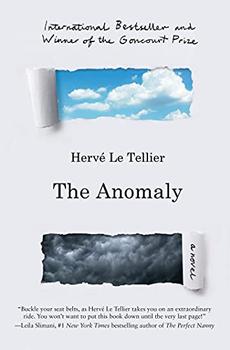Summary | Excerpt | Reviews | Beyond the book | Read-Alikes | Genres & Themes | Author Bio

A Novel
by Hervé Le TellierHervé Le Tellier's novel The Anomaly, translated from French into English by Adriana Hunter, follows the lives of a dozen or so characters, strangers to each other but connected by the transatlantic flight most of them took in March 2021, which experienced a violent bout of turbulence. Le Tellier begins by providing his characters' backstories up to June 2021, when FBI agents start knocking on their doors; the first third of the novel is this extended setup—new chapter, new character introduced, new life story told—during which it becomes clear that something strange—perhaps fantastical, definitely inauspicious—happened during the flight. A reader's experience with these first 150 pages will depend on how much they enjoy sweeping exposition and glimpses into disparate characters' inner lives; it's toward the end of the first part and into the second that the momentum really builds, as the mystery of what is called the Anomaly begins to coalesce. This middle section is where the book is most exciting and where its thriller designation is earned, and for this reason I won't even hint at what the Anomaly is, ignorance being, in this case, a precious resource.
The Anomaly is a fun book, if not a hilarious one; it's playful in its self-referentiality (there's a book within the book, also called The Anomaly) and its engagement with different fiction genres and tropes (political satire, family man who's secretly an assassin). Le Tellier pokes fun at the more risible aspects of contemporary Western society—late night talk shows, Saturday Night Live, action and alien movies, teenage vampire books, political leaders—but also takes them seriously as forces that affect and have a place in people's lives. The hitman passenger owes his killing techniques to Hollywood scriptwriters; the government agents interviewing passengers get their questions from Close Encounters of the Third Kind. Everyone knows this stuff is silly, the novel suggests; still, we can't seem to escape it.
The political satire comes in the second half of the book; after the Anomaly is revealed, Le Tellier mostly ignores the passengers and turns his focus to the American government's response, featuring a useless, unnamed president. The result is sometimes funny and sometimes a little groan-inducing for how much it relies on obvious if not inaccurate Trump jokes (the blonde wig, the petulance). It was more fun for me to read these sections not as straightforward satire of Trump but as a clever way of showing that this rather bumbling character who is way out of his depth could be any number of American presidents (the book does take place in March 2021, well after the election, although it was written and originally published in France before this). This is a novel in part about doppelgangers—about what makes a person unique, and the point at which one person diverges from another—and it's interesting to draw out the metaphor here: allegedly dichotomous politicians as mere "doubles."
The narration of The Anomaly is omniscient and authoritative; the point of view moves through characters, even minor ones, like a parasite, burrowing into a host until it's exhausted the resources of their thoughts and backstory before jumping into a new one. That's the kind of simile—a little forced, a little fun—that wouldn't be out of place in The Anomaly, and which might prompt a character to claim that they can't stand metaphors, one of Le Tellier's self-referential tics. The chapters that follow French characters read to me as more natural and better written than those about the Americans or a Nigerian pop star, which felt a bit over-researched and deliberately representational (we get long, detailed paragraphs about soldiers in Afghanistan, Nigerian cultural politics, racism in the American South). Perhaps they're a parody of the television series Lost's flashback scenes; either way, these sections are too static and surveying to be really emotionally affecting.
The strength of The Anomaly lies in its science-fictional bent, this striking new world that Le Tellier creates, halfway through, with its myriad philosophical and psychological ramifications. I would recommend it to a reader who tends to like mystery and thriller books—that heart-pounding, breath-holding desire to know what's going on—and is looking for something that raises philosophical and social issues. Or, on the other hand, to someone who is usually drawn to literary realism, but wants to inject a little more plotty excitement and mystery into their reading life. A reader who requires hardcore scientific worldbuilding or intense emotional stakes will be left wanting, but for the rest of us—who might not have realized, until now, how long it's been since we were genuinely surprised by a novel—The Anomaly should prove a fun and interesting read.
![]() This review
first ran in the January 5, 2022
issue of BookBrowse Recommends.
This review
first ran in the January 5, 2022
issue of BookBrowse Recommends.

If you liked The Anomaly, try these:

by Frankie Barnet
Published 2025
In a pre-apocalyptic world not unlike our own, a young Instagram poet starts an affair with a California billionaire who's promised a time machine that will make everything normal again—whatever that means.

by John Scalzi
Published 2025
New York Times bestseller John Scalzi flies you to the moon with his most fantastic tale to date: When the Moon Hits Your Eye.
Your guide toexceptional books
BookBrowse seeks out and recommends the best in contemporary fiction and nonfiction—books that not only engage and entertain but also deepen our understanding of ourselves and the world around us.